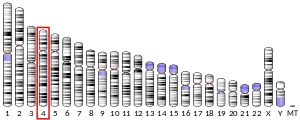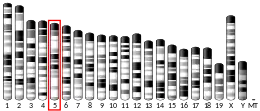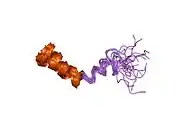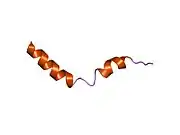Alpha-2C adrenergic receptor
The alpha-2C adrenergic receptor (α2C adrenoceptor), also known as ADRA2C, is an alpha-2 adrenergic receptor, and also denotes the human gene encoding it.[5]
Receptor
Alpha-2-adrenergic receptors include 3 highly homologous subtypes: alpha2A, alpha2B, and alpha2C. These receptors have a critical role in regulating neurotransmitter release from sympathetic nerves and from adrenergic neurons in the central nervous system. Studies in mice revealed that both the alpha2A and alpha2C subtypes were required for normal presynaptic control of transmitter release from sympathetic nerves in the heart and from central noradrenergic neurons; the alpha2A subtype inhibited transmitter release at high stimulation frequencies, whereas the alpha2C subtype modulated neurotransmission at lower levels of nerve activity.[6]
Gene
This gene encodes the alpha2C subtype, which contains no introns in either its coding or untranslated sequences.[5]
Ligands
Agonists
- (R)-3-Nitrobiphenyline (also weak antagonist at α2A and α2B)[7]
Antagonists
- BMY 7378 (also α1D antagonist)[8]
- JP-1302: selective over α2A, α2B, α2C[9]
- N-{2-[4-(2,3-dihydro-benzo[1,4]dioxin-2-ylmethyl)-[1,4]diazepan-1-yl]-ethyl}-2-phenoxy-nicotinamide[10]
- Quetiapine [11]
- Risperidone
- Spiroxatrine
- Yohimbine derivatives 9 and 10: >43 fold selectivity over α2A, α2B and α1 subtypes[12]
See also
References
- GRCh38: Ensembl release 89: ENSG00000184160 - Ensembl, May 2017
- GRCm38: Ensembl release 89: ENSMUSG00000045318 - Ensembl, May 2017
- "Human PubMed Reference:". National Center for Biotechnology Information, U.S. National Library of Medicine.
- "Mouse PubMed Reference:". National Center for Biotechnology Information, U.S. National Library of Medicine.
- "Entrez Gene: ADRA2C adrenergic, alpha-2C-, receptor".
- "ADRA2C adrenoceptor alpha 2C [Homo sapiens (human)] - Gene - NCBI". www.ncbi.nlm.nih.gov. Retrieved 2018-09-11.
- Crassous PA, Cardinaletti C, Carrieri A, Bruni B, Di Vaira M, Gentili F, Ghelfi F, Giannella M, Paris H, Piergentili A, Quaglia W, Schaak S, Vesprini C, Pigini M (August 2007). "Alpha2-adrenoreceptors profile modulation. 3.1 (R)-(+)-m-nitrobiphenyline, a new efficient and alpha2C-subtype selective agonist". Journal of Medicinal Chemistry. 50 (16): 3964–8. doi:10.1021/jm061487a. PMID 17630725.
- Cleary L, Murad K, Bexis S, Docherty JR (2005). "The alpha (1D)-adrenoceptor antagonist BMY 7378 is also an alpha (2C)-adrenoceptor antagonist". Auton Autacoid Pharmacol. 25 (4): 135–41. doi:10.1111/j.1474-8673.2005.00342.x. PMID 16176444.
- Sallinen J, Höglund I, Engström M, Lehtimäki J, Virtanen R, Sirviö J, Wurster S, Savola JM, Haapalinna A (2007). "Pharmacological characterization and CNS effects of a novel highly selective alpha2C-adrenoceptor antagonist JP-1302". Br. J. Pharmacol. 150 (4): 391–402. doi:10.1038/sj.bjp.0707005. PMC 2189732. PMID 17220913.
- Patel SD, Habeski WM, Min H, Zhang J, Roof R, Snyder B, Bora G, Campbell B, Li C, Hidayetoglu D, Johnson DS, Chaudhry A, Charlton ME, Kablaoui NM (2008). "Identification and SAR around N-{2-[4-(2,3-dihydro-benzo[1,4]dioxin-2-ylmethyl)-[1,4]diazepan-1-yl]-ethyl}-2-phenoxy-nicotinamide, a selective alpha2C adrenergic receptor antagonist". Bioorg. Med. Chem. Lett. 18 (20): 5689–93. doi:10.1016/j.bmcl.2008.08.055. PMID 18799310.
- Jensen NH, Rodriguiz RM, Caron MG, Wetsel WC, Rothman RB, Roth BL (September 2008). "N-desalkylquetiapine, a potent norepinephrine reuptake inhibitor and partial 5-HT1A agonist, as a putative mediator of quetiapine's antidepressant activity". Neuropsychopharmacology. 33 (10): 2303–12. doi:10.1038/sj.npp.1301646. PMID 18059438.
- Bavadekar SA, Ma G, Mustafa SM, Moore BM, Miller DD, Feller DR (November 2006). "Tethered yohimbine analogs as selective human alpha2C-adrenergic receptor ligands". J. Pharmacol. Exp. Ther. 319 (2): 739–48. doi:10.1124/jpet.106.105981. PMID 16873606. S2CID 31412932.
External links
- Human ADRA2C genome location and ADRA2C gene details page in the UCSC Genome Browser.
Further reading
- Coupry I, Duzic E, Lanier SM (1992). "Factors determining the specificity of signal transduction by guanine nucleotide-binding protein-coupled receptors. II. Preferential coupling of the alpha 2C-adrenergic receptor to the guanine nucleotide-binding protein, Go". J. Biol. Chem. 267 (14): 9852–7. PMID 1349607.
- Chhajlani V, Rangel N, Uhlén S, Wikberg JE (1991). "Identification of an additional gene belonging to the alpha 2 adrenergic receptor family in the human genome by PCR". FEBS Lett. 280 (2): 241–4. doi:10.1016/0014-5793(91)80301-I. PMID 1849485. S2CID 26642747.
- Regan JW, Kobilka TS, Yang-Feng TL, Caron MG, Lefkowitz RJ, Kobilka BK (1988). "Cloning and expression of a human kidney cDNA for an alpha 2-adrenergic receptor subtype". Proc. Natl. Acad. Sci. U.S.A. 85 (17): 6301–5. doi:10.1073/pnas.85.17.6301. PMC 281957. PMID 2842764.
- Eason MG, Liggett SB (1993). "Human alpha 2-adrenergic receptor subtype distribution: widespread and subtype-selective expression of alpha 2C10, alpha 2C4, and alpha 2C2 mRNA in multiple tissues". Mol. Pharmacol. 44 (1): 70–5. PMID 7688069.
- Riess O, Thies U, Siedlaczck I, Potisek S, Graham R, Theilmann J, Grimm T, Epplen JT, Hayden MR (1994). "Precise mapping of the brain alpha 2-adrenergic receptor gene within chromosome 4p16". Genomics. 19 (2): 298–302. doi:10.1006/geno.1994.1061. PMID 8188260.
- Klein U, Ramirez MT, Kobilka BK, von Zastrow M (1997). "A novel interaction between adrenergic receptors and the alpha-subunit of eukaryotic initiation factor 2B". J. Biol. Chem. 272 (31): 19099–102. doi:10.1074/jbc.272.31.19099. PMID 9235896.
- Schaak S, Devedjian JC, Cayla C, Sender Y, Paris H (1998). "Molecular cloning, sequencing and functional study of the promoter region of the human alpha2C4-adrenergic receptor gene". Biochem. J. 328 (2): 431–8. doi:10.1042/bj3280431. PMC 1218938. PMID 9371698.
- DeGraff JL, Gagnon AW, Benovic JL, Orsini MJ (1999). "Role of arrestins in endocytosis and signaling of alpha2-adrenergic receptor subtypes". J. Biol. Chem. 274 (16): 11253–9. doi:10.1074/jbc.274.16.11253. PMID 10196213.
- Prezeau L, Richman JG, Edwards SW, Limbird LE (1999). "The zeta isoform of 14-3-3 proteins interacts with the third intracellular loop of different alpha2-adrenergic receptor subtypes". J. Biol. Chem. 274 (19): 13462–9. doi:10.1074/jbc.274.19.13462. PMID 10224112.
- Hein L, Altman JD, Kobilka BK (2000). "Two functionally distinct alpha2-adrenergic receptors regulate sympathetic neurotransmission". Nature. 402 (6758): 181–4. doi:10.1038/46040. PMID 10647009. S2CID 205047992.
- Small KM, Forbes SL, Rahman FF, Bridges KM, Liggett SB (2000). "A four amino acid deletion polymorphism in the third intracellular loop of the human alpha 2C-adrenergic receptor confers impaired coupling to multiple effectors". J. Biol. Chem. 275 (30): 23059–64. doi:10.1074/jbc.M000796200. PMID 10801795.
- Comings DE, Gade-Andavolu R, Gonzalez N, Wu S, Muhleman D, Blake H, Chiu F, Wang E, Farwell K, Darakjy S, Baker R, Dietz G, Saucier G, MacMurray JP (2001). "Multivariate analysis of associations of 42 genes in ADHD, ODD and conduct disorder". Clin. Genet. 58 (1): 31–40. doi:10.1034/j.1399-0004.2000.580106.x. PMID 10945659. S2CID 43815350.
- Small KM, Wagoner LE, Levin AM, Kardia SL, Liggett SB (2002). "Synergistic polymorphisms of beta1- and alpha2C-adrenergic receptors and the risk of congestive heart failure". N. Engl. J. Med. 347 (15): 1135–42. doi:10.1056/NEJMoa020803. PMID 12374873.
- Chotani MA, Mitra S, Su BY, Flavahan S, Eid AH, Clark KR, Montague CR, Paris H, Handy DE, Flavahan NA (2004). "Regulation of alpha(2)-adrenoceptors in human vascular smooth muscle cells". Am. J. Physiol. Heart Circ. Physiol. 286 (1): H59–67. doi:10.1152/ajpheart.00268.2003. PMID 12946937.
- Small KM, Mialet-Perez J, Seman CA, Theiss CT, Brown KM, Liggett SB (2004). "Polymorphisms of cardiac presynaptic alpha2C adrenergic receptors: Diverse intragenic variability with haplotype-specific functional effects". Proc. Natl. Acad. Sci. U.S.A. 101 (35): 13020–5. doi:10.1073/pnas.0405074101. PMC 516511. PMID 15319474.
- Chotani MA, Mitra S, Eid AH, Han SA, Flavahan NA (2005). "Distinct cAMP signaling pathways differentially regulate alpha2C-adrenoceptor expression: role in serum induction in human arteriolar smooth muscle cells". Am. J. Physiol. Heart Circ. Physiol. 288 (1): H69–76. doi:10.1152/ajpheart.01223.2003. PMID 15345481.
- Belfer I, Buzas B, Hipp H, Phillips G, Taubman J, Lorincz I, Evans C, Lipsky RH, Enoch MA, Max MB, Goldman D (2005). "Haplotype-based analysis of alpha 2A, 2B, and 2C adrenergic receptor genes captures information on common functional loci at each gene". J. Hum. Genet. 50 (1): 12–20. doi:10.1007/s10038-004-0211-y. PMID 15592690.
- Neumeister A, Charney DS, Belfer I, Geraci M, Holmes C, Sharabi Y, Alim T, Bonne O, Luckenbaugh DA, Manji H, Goldman D, Goldstein DS (2005). "Sympathoneural and adrenomedullary functional effects of alpha2C-adrenoreceptor gene polymorphism in healthy humans". Pharmacogenet. Genomics. 15 (3): 143–9. doi:10.1097/01213011-200503000-00002. PMID 15861038. S2CID 479475.
- Neumeister A, Drevets WC, Belfer I, Luckenbaugh DA, Henry S, Bonne O, Herscovitch P, Goldman D, Charney DS (2006). "Effects of an alpha 2C-adrenoreceptor gene polymorphism on neural responses to facial expressions in depression". Neuropsychopharmacology. 31 (8): 1750–6. doi:10.1038/sj.npp.1301010. PMID 16407897.
- Park JS, Zhang SY, Jo SH, Seo JB, Li L, Park KW, Oh BH, Park YB, Kim HS (2006). "Common adrenergic receptor polymorphisms as novel risk factors for vasospastic angina". Am. Heart J. 151 (4): 864–9. doi:10.1016/j.ahj.2005.06.009. PMID 16569551.








